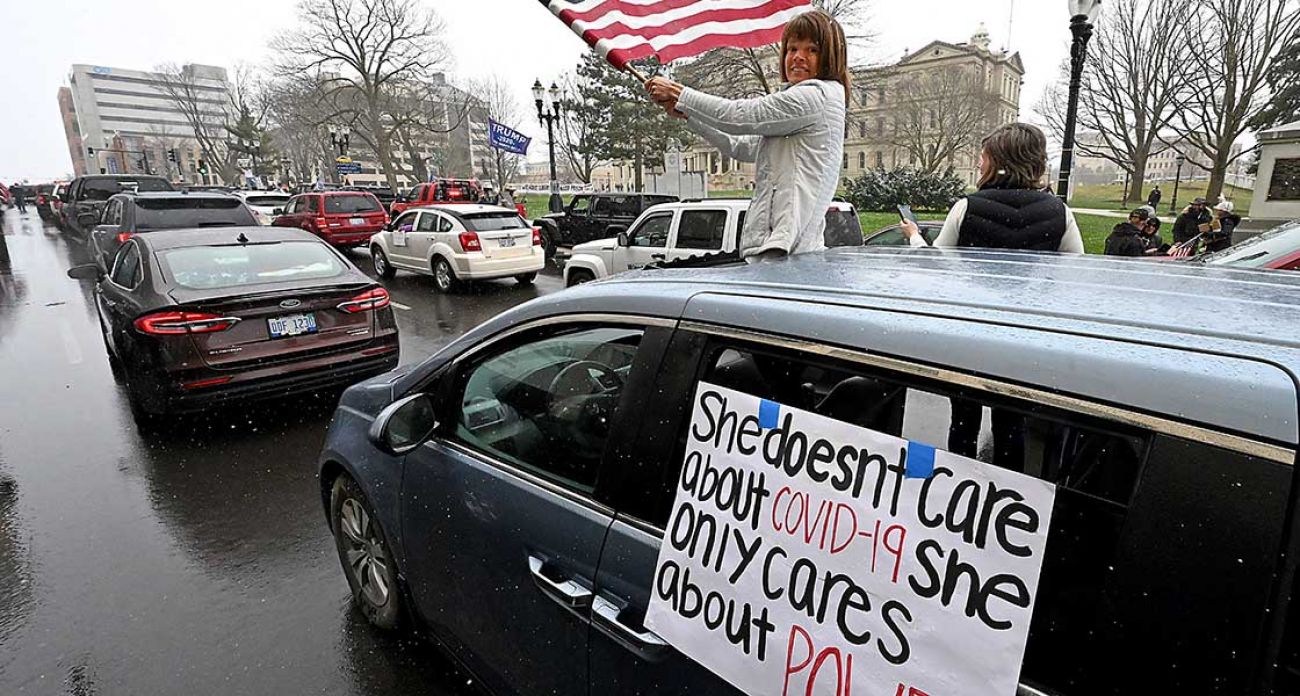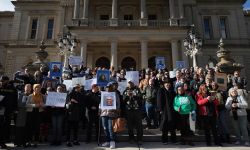‘Liberate Michigan’: Months of angry rhetoric precede Whitmer kidnap plot

Ongoing updates: Plot to kidnap Whitmer | Who's charged, what's next?
Michigan was still early into its coronavirus lockdown when tensions publicly flared between Gov. Gretchen Whitmer and President Donald Trump as coronavirus raged through southeast Michigan and the state fought for enough medical equipment to handle it.
“Your Governor, Gretchen ‘Half’ Whitmer is way in over her ahead, she doesn't have a clue,” President Trump tweeted March 27 about the state’s Democratic leader.
Since then, vitriol has spewed from the internet to the lawn of the Michigan Capitol, reaching into everyday interactions among residents as they navigated the global pandemic. The virus defined the state’s political divide.
Arguments over masks, executive authority and personal freedoms took center stage, with threats against Whitmer sometimes accompanying them.
Related stories:
- FBI claims Michigan militia group tried to kidnap Gov. Gretchen Whitmer
- Gun ban unlikely at Michigan Capitol, despite plot to storm it, take hostages
- Whitmer accuses Trump of ‘fomenting anger’ that fueled Michigan kidnap plot
- Two brothers charged in Whitmer plot photographed with guns at Capitol
- Gov. Gretchen Whitmer’s year: Nooses, beheadings and shouts of tyranny
"I knew this job would be hard, but I'll be honest, I never could have imagined anything like this," Whitmer said Thursday, following federal charges against six so-called militia members accused of plotting to kidnap her. Another seven people have been charged by Attorney General Dana Nessel for related charges, including terrorism.
Republicans and Democrats alike condemned the alleged plot on Thursday, and social media accounts of the men accused indicate they harbored a hatred of the government long before Whitmer’s coronavirus orders.
But the orders have been the focus of coarse rhetoric and occasional violence all year. Here’s a look:
March 10: Whitmer announces the first two cases of coronavirus in the state and declares a state of emergency, which allows her to issue executive orders governing the public health response.
March 23: Whitmer issues a “stay-at-home” order requiring Michigan residents to stay home except to do essential functions such as grocery shopping, getting medical treatment, or exercising. Most businesses are restricted to mainly remote work.
LIBERATE MICHIGAN!
— Donald J. Trump (@realDonaldTrump) April 17, 2020
April 9: Whitmer extends the stay-at-home order with some modifications, including restrictions that inflame frustrations in some parts of the state. That included the continued closure of businesses some saw as safe enough to reopen, such as landscaping businesses and golf courses.
April 10: Senate Majority Leader Mike Shirkey, R-Clarklake, writes on Facebook “OUR Governor IS DESTROYING OUR HEALTH BY KILLING OUR LIVELIHOODS!”
April 15: The first major protest of Whitmer’s executive orders, “Operation Gridlock” organized by the Michigan Conservative Coalition, takes place in Lansing. Some attendees carry rifles.
April 17: President Donald Trump tweets “LIBERATE MICHIGAN!” The tweet is an apparent reference to Michigan’s COVID-19 restrictions.
April 23: Demonstrators, some carrying guns, gather outside Whitmer’s Lansing home to protest stay-home orders, prompting a rebuke from Shirkey. The protest’s organizer, Brandon Hall of Petoskey, responds that Shirkey should “shut his damn mouth.”
April 24: Whitmer extends the stay-at-home order a third time as she nears the end of the Legislature-approved state of emergency. It reopens landscapers, plant nurseries, motor boating, golfing and travel between homes. The new order also requires people to wear masks inside public spaces. Meanwhile, state lawmakers vote to repeal the 1945 law Whitmer says she will use to continue her executive authority if they don’t extend the state of emergency, though the move is largely symbolic.
April 24: Republican Sen. Dale Zorn wears a mask resembling a Confederate flag to the Capitol to vote on Michigan COVID-19 measures. Zorn later says the mask’s imagery was not the Confederate flag and even if it was, the flag is “our national history.” Zorn later calls the choice to wear the mask an “error in judgement.”
April 29: GOP leaders propose a two-week extension of the state of emergency in exchange for a public promise by the governor to work with lawmakers for future executive orders. The Whitmer administration rejects the proposal by releasing a private email exchange with an aide to Shirkey to reporters.
April 29: Shirkey tells MIRS News that Whitmer has made it clear she’s “comfortable being a dictator” and calling the email release a “double middle finger” from the administration.
April 30: Whitmer extends the state of emergency to May 28 without the Legislature’s approval, citing a 1945 law that gives her the right to do so. The GOP threatens to sue.
April 30: Armed demonstrators enter the Michigan Capitol with rifles as part of a protest against COVID-19 orders. At least one protester carried a Confederate flags and another sign read “Tyrants Get the Rope.”
In a tweet, Trump later refers to the protesters as “very good people, but they are angry.”
The incident rekindles a long-standing debate about whether guns should continue to be allowed at the Capitol.
May 6: The GOP-led Legislature sues Whitmer over her use of the 1945 law to continue the state of emergency without its approval.
May 8: Days before the Michigan Capitol Commission meets to consider banning guns inside the Capitol, Michigan Attorney General Dana Nessel says the panel may have “blood on their hands” if it fails to ban guns.
May 11: Detroit Metro Times reports that Whitmer opponents are spreading violent threats against the governor in private Facebook groups. Whitmer responds by asking Republican legislative leaders to denounce violent speech, prompting Shirkey, the Senate majority leader, and Speaker of the House Lee Chatfield to condemn those making threats. “Those making physical threats (to both parties) are out of line and should be punished,” Chatfield wrote.
May 14: A fight erupts outside the Capitol after a protester hangs a doll from a noose during a protest against Whitmer’s emergency orders. Many in the crowd of hundreds who showed up to protest were armed, and police confiscated an ax from one protester. Rally organizers called the doll “hate speech.”
May 15: Michigan State Police officials announce charges against Detroit man Robert S. Tesh, who they allege made credible threats to kill Whitmer and Attorney General Dana Nessel. Authorities note the threats were not specifically tied to COVID-19 orders.
May 16: Barry County Sheriff Dar Leaf tells the crowd at an antilockdown rally in Grand Rapids that Whitmer’s stay-at-home order is akin to being placed under arrest, and calls it an “unlawful arrest.” The sheriff and some others say they will not enforce the governor’s executive orders.
May 18: Whitmer announces she’ll allow restaurants, bars, retail stores and offices to reopen before Memorial Day weekend in northern Michigan and the Upper Peninsula.
May 25: Whitmer apologizes after reports surface that her husband, Marc Mallory, attempted to use his position to persuade a northern Michigan dock company to put the family’s boat in the water before Memorial Day weekend. Whitmer says the request was a failed joke.
June 1: Whitmer lifts the stay-at-home order statewide, allowing outdoor gatherings and the reopening of restaurants, bars and retail stores days later.
July 14: Public conflict over emergency orders percolates across the state, including over mask mandates. Police fatally shoot a 43-year-old Sean Ernest Ruis after he stabbed another man during a confrontation over masks at a Lansing Quality Dairy convenience store. Two days earlier, a customer at Meijer in Acme, east of Traverse City, pulls a knife on a worker who asked him to wear a mask while shopping.
Sept. 8: The Michigan Republican Party Twitter account retweets a story from The Washington Free Beacon, a conservative website, criticizing recent security upgrades at the governor’s mansion, highlighting a quote from the story that states “@GovWhitmer has long questioned the effectiveness of physical barriers, but is asking Michigan taxpayers to foot the bill for a seven-figure project to keep out uninvited guests."
Oct. 2: Michigan Supreme Court determines Whitmer does not have the power to issue executive orders without the consent of the Legislature. In subsequent days, Whitmer’s administration moves to reissue orders through the state health department, a move decried by the GOP.
Oct. 8: Federal authorities announced they’ve thwarted a plan to kidnap Whitmer.
Oct. 8: After the arrests, Shirkey tweets that “a threat against our governor is a threat against us all. We condemn those who plotted against her and our government. They are not patriots there is no honor in their actions. They are criminals and traitors and they should be prosecuted to the fullest extent of the law.”
See what new members are saying about why they donated to Bridge Michigan:
- “In order for this information to be accurate and unbiased it must be underwritten by its readers, not by special interests.” - Larry S.
- “Not many other media sources report on the topics Bridge does.” - Susan B.
- “Your journalism is outstanding and rare these days.” - Mark S.
If you want to ensure the future of nonpartisan, nonprofit Michigan journalism, please become a member today. You, too, will be asked why you donated and maybe we'll feature your quote next time!




